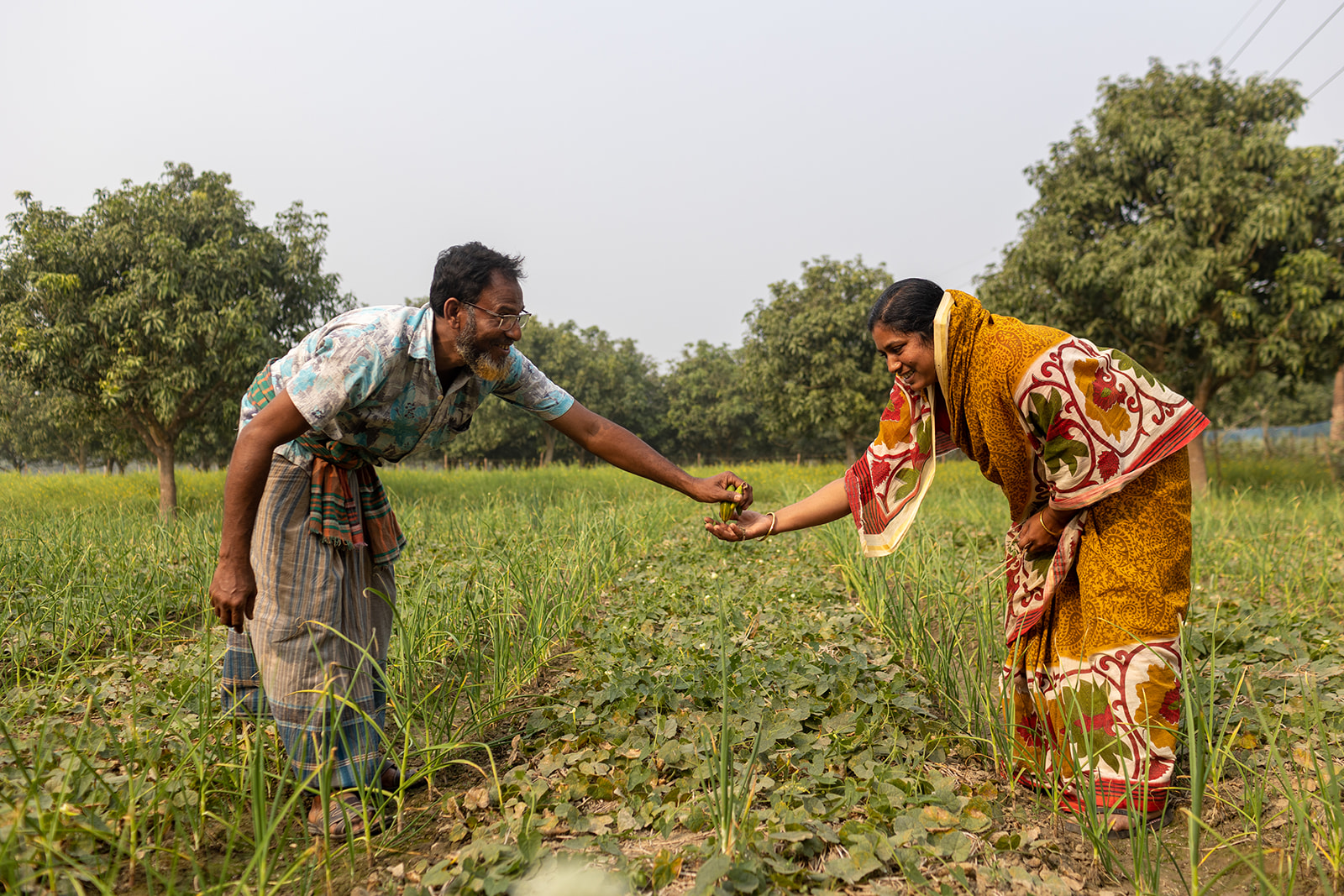Highlights
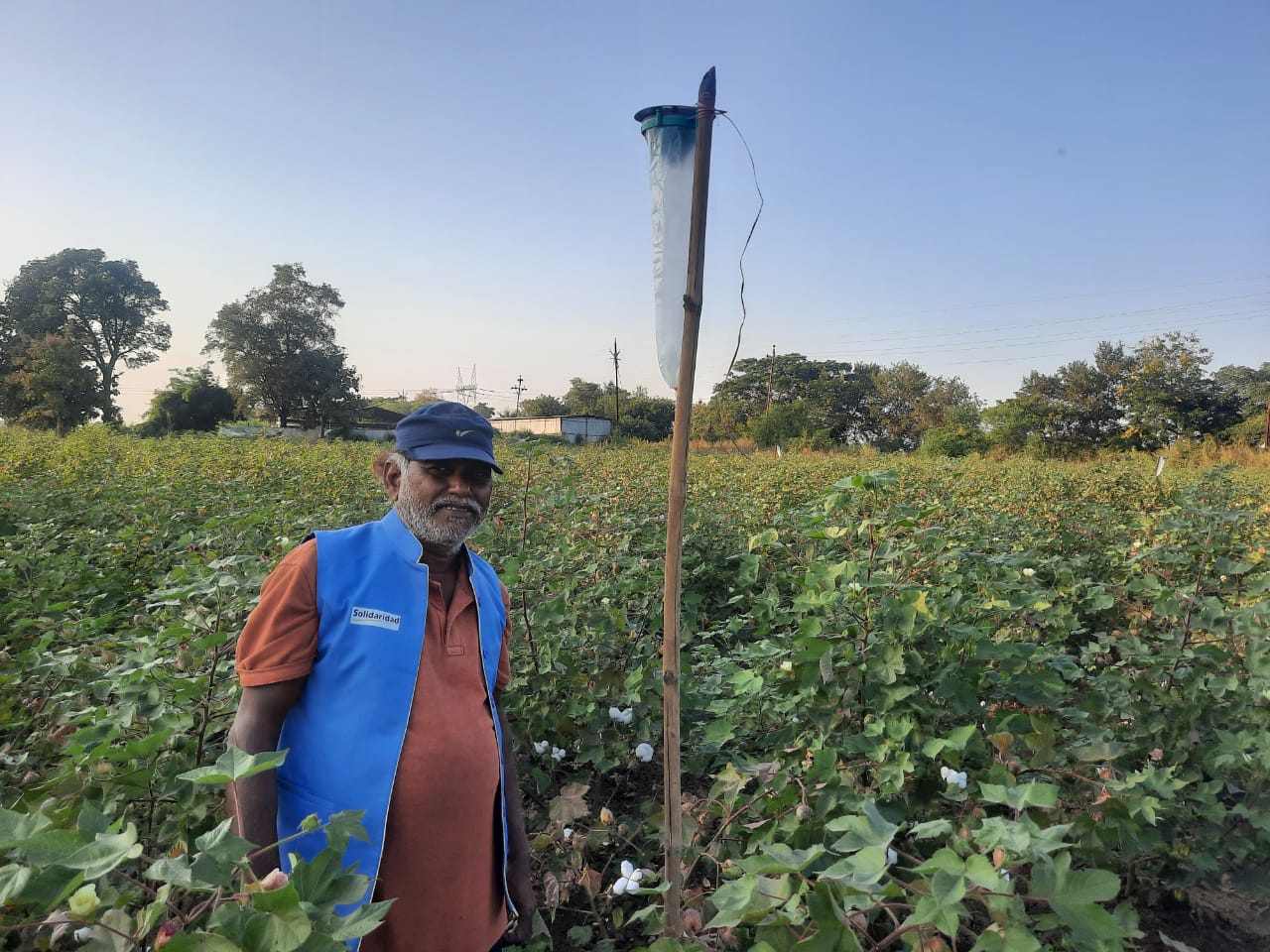
Regenerative Agriculture
Solidaridad promoted regenerative practices in Asia such as crop diversification, tree planting, reduced tillage, mulching, and water conservation techniques that would lead to better soil organic content capturing and storage along with reduced emissions. These practices remove carbon present in the atmosphere and return it to the ground, thus converting the croplands into a “carbon sink.”
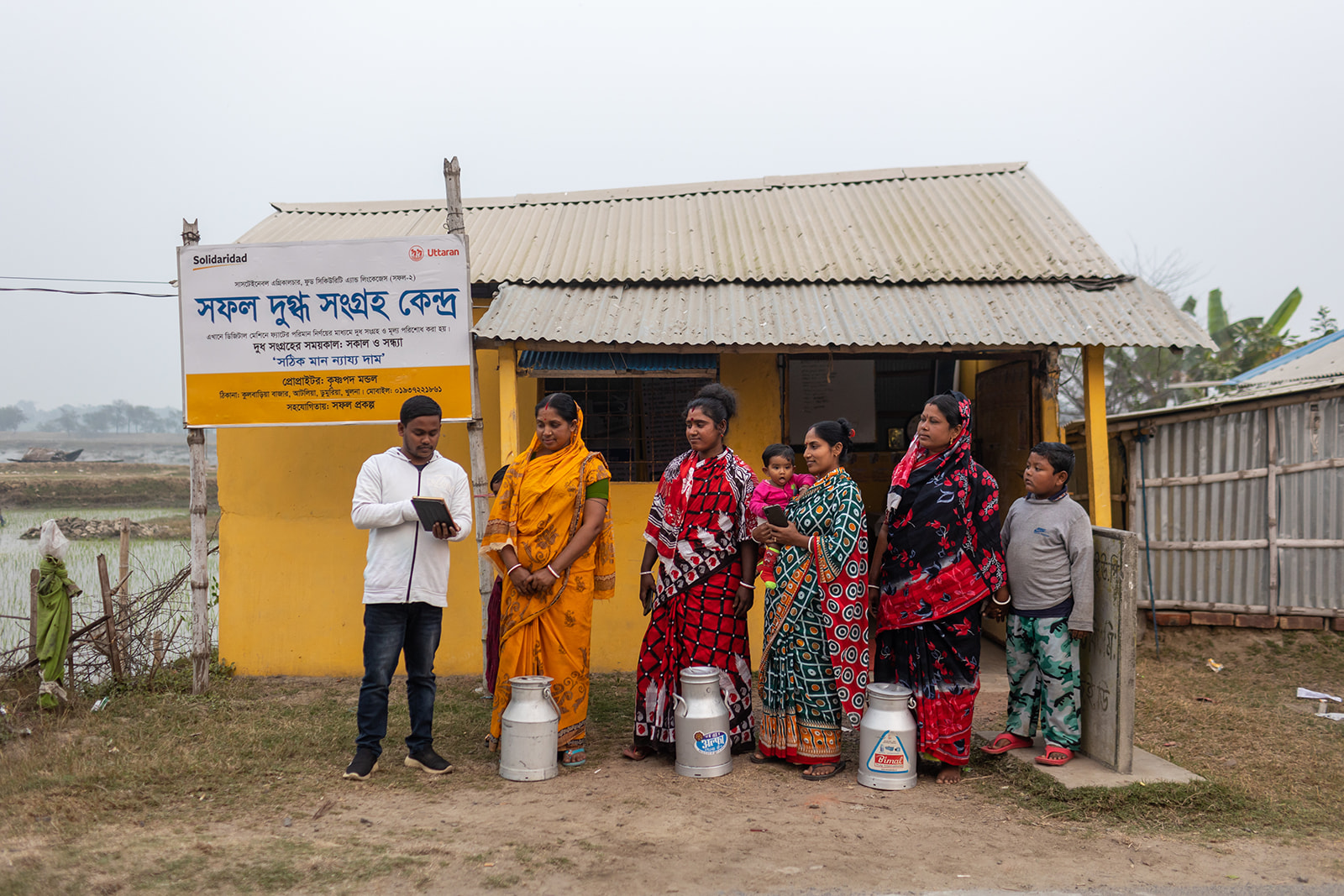
Digital Solutions
The digital divide is a major contributor to further widening the gender gap in agriculture. Through our digital interventions, we have brought nearly 12,000 women farmers in Bangladesh and 5,000 in India into the formal supply chain. Additionally, financial inclusion has strengthened their position in the formal market system.
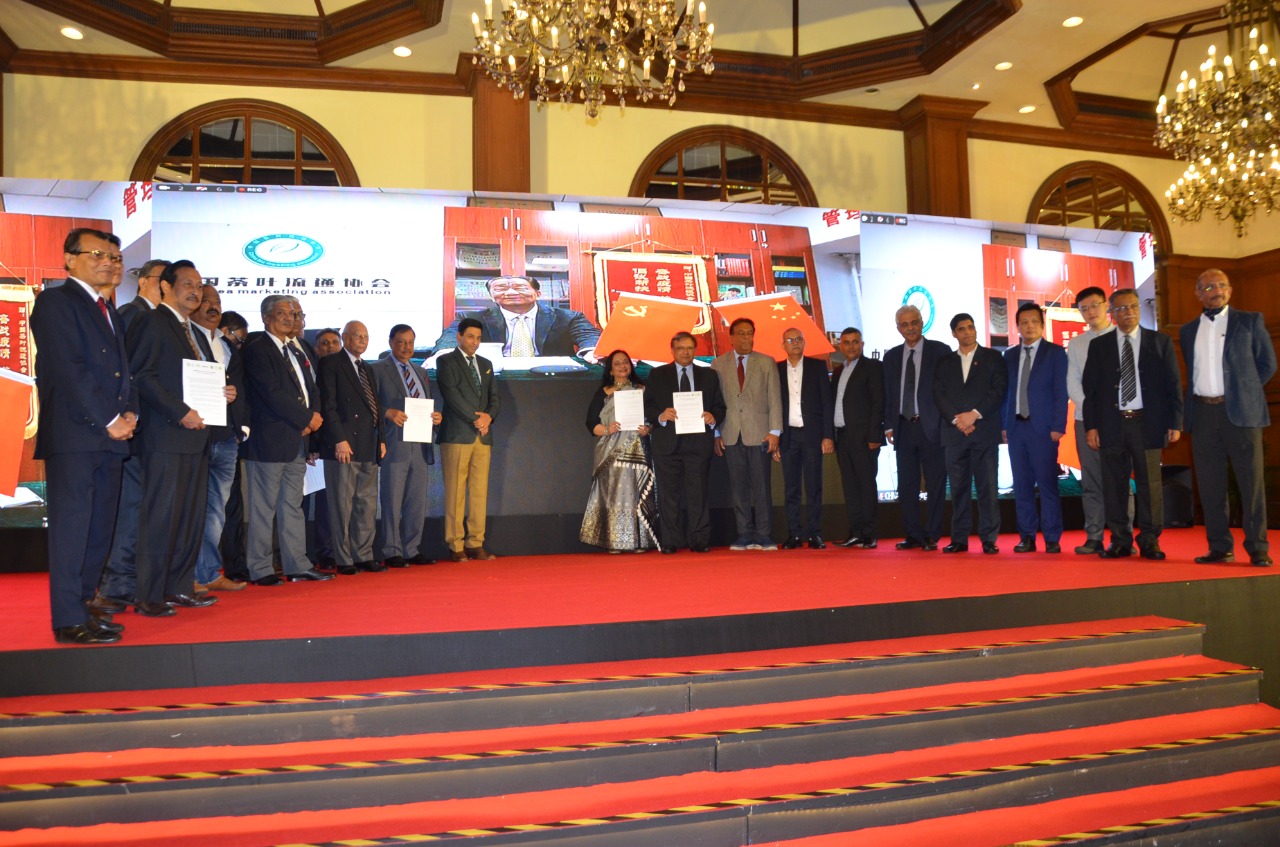
Regional Sustainability Initiatives
Although Asian countries are among the major producers/consumers of agricultural commodities, they do not enjoy a majority stakeholder voice at the global policy table. The initiatives have been instrumental in promoting the voice of the region through multi-stakeholder platforms on tea, palm oil and cotton. These platforms are also demanding commitment to sustainability in the producer supply chain.
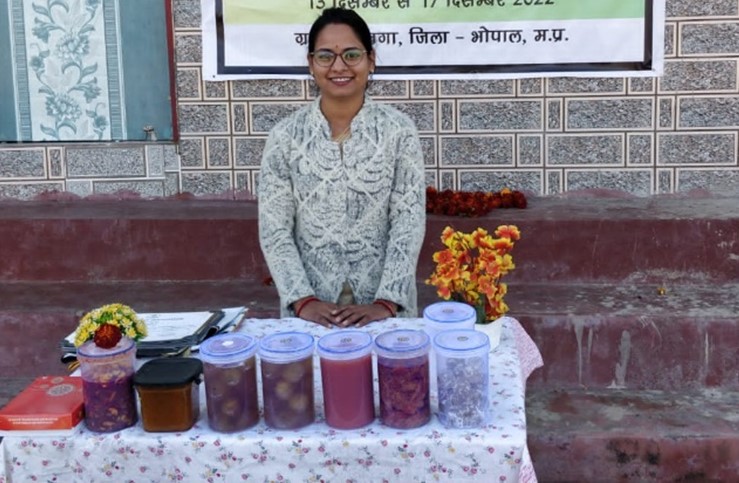
Farmer-Owned Organizations
Solidaridad in Asia is empowering farmers to play a larger role in the agricultural supply chain, by supporting and strengthening farmer producer organizations and cooperatives. Village Super Market in Bangladesh is now a farmer owned organization. Groups of ambitious soy farmers are being supported with training in making high value products like tofu and building market linkages. In Bangladesh, Solidaridad-trained women entrepreneurs are running milk collection centres.
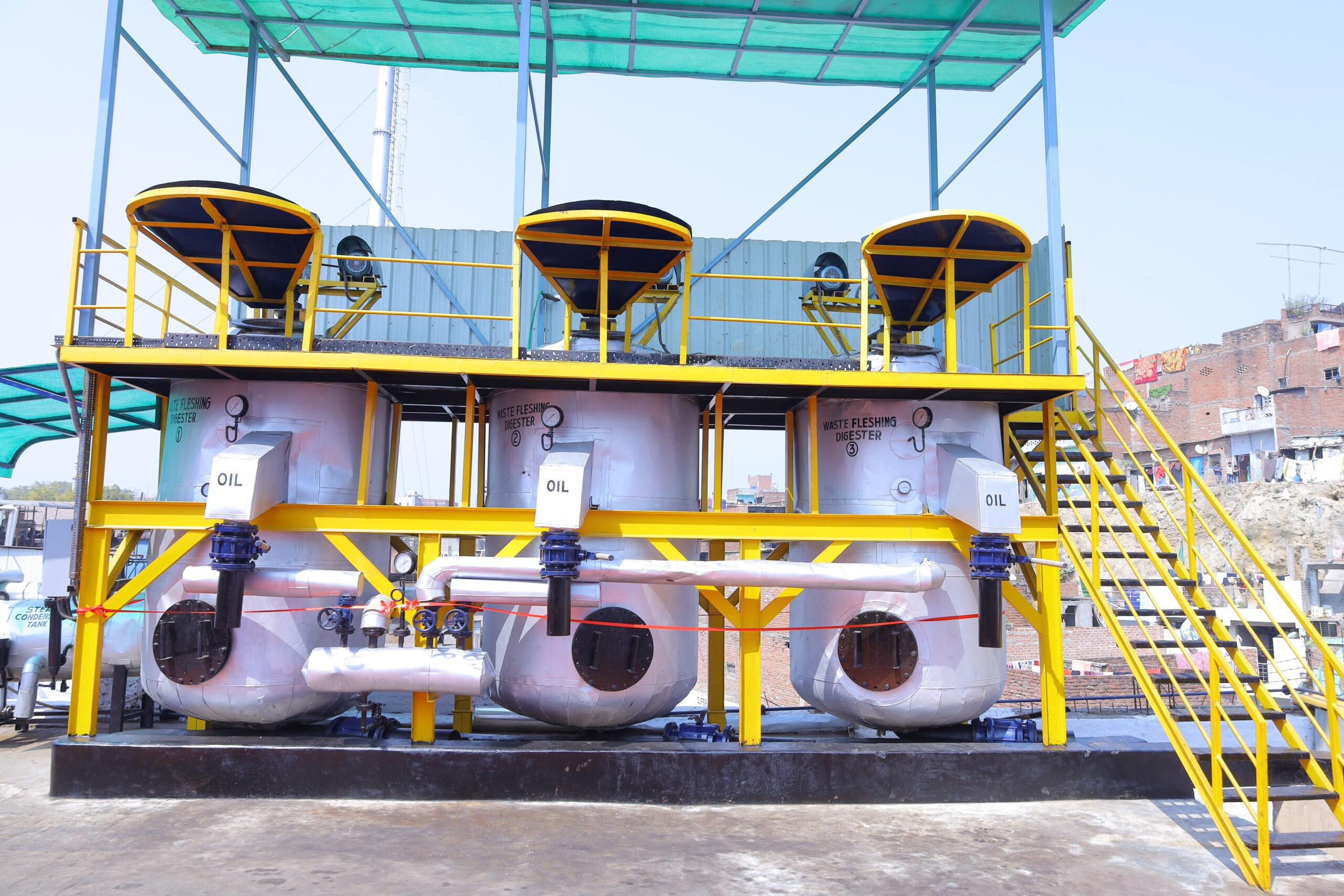
Pollution Abatement
Our innovative solutions to tackle solid waste management and clean water in leather and textiles has further strengthened our pollution abatement agenda. The success from our leather projects in Kanpur and Kolkata is being recognized, both nationally and internationally, for reducing pollution and conserving water during leather processing. The results are now replicated in another major leather cluster in Tamil Nadu, India. Initiatives like Sustainability Scorecard Matrix, launched as part of the Leather Trade Intelligence Portal, bring focus on sustainable supply chain within the leather sector in India.
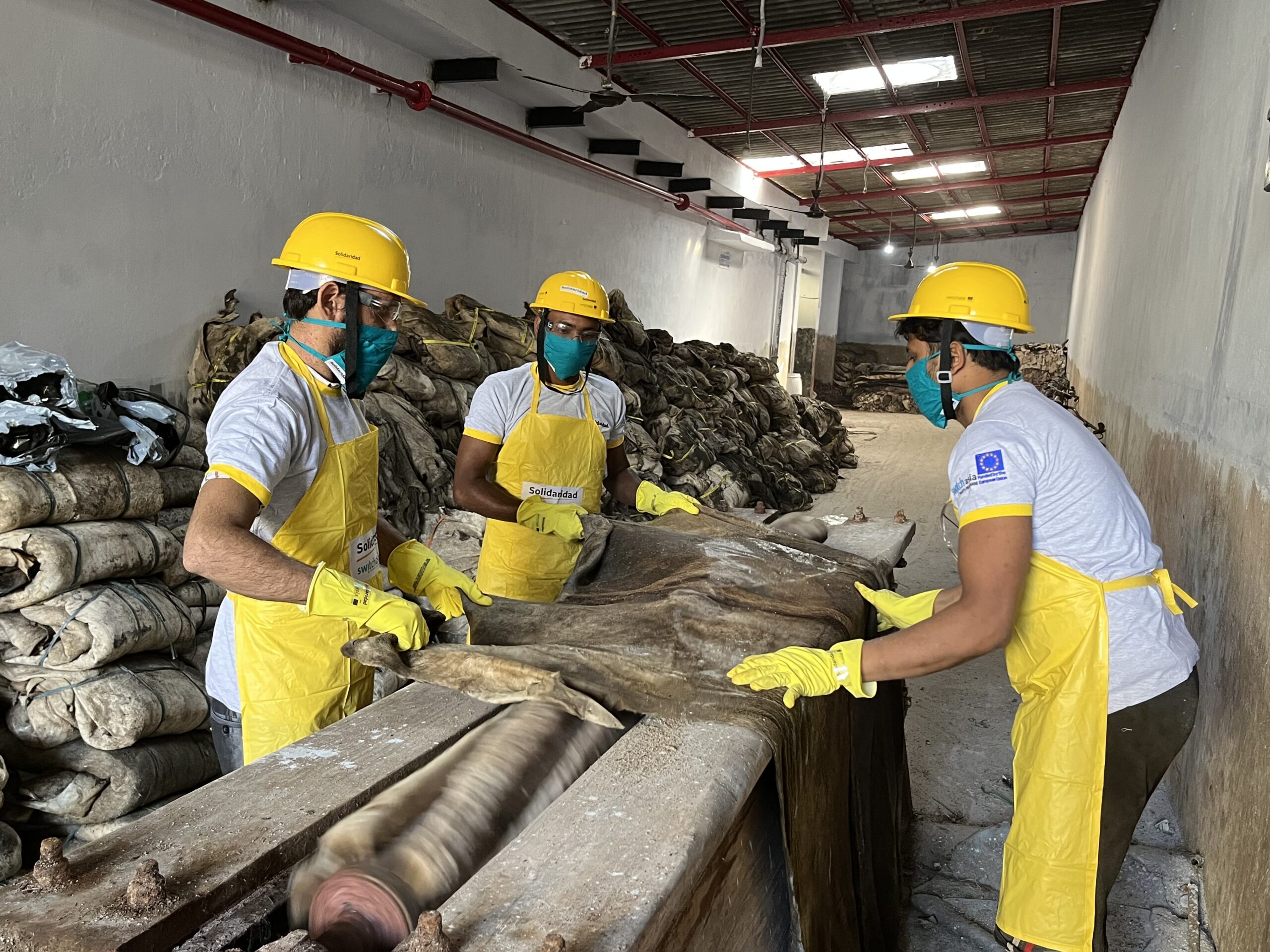
Workers well-being
In minerals, we have worked to strengthen our Code of Responsible Extraction initiative, which improves working conditions among the mining communities. These include providing drinking water facilities, separate toilets for men and women, rest shelters for workers, creche facilities for lactating mothers, etc. Worker well-being is also a key focus across our projects in leather; workers are trained on occupational safety and health, provided safety kits, etc. In Sri Lanka, the Reaching the Unreached project focused on water, sanitation and hygiene.
Results

2,940
agricultural service providers with increased income

851 thousand
hectares under Good Agricultural Practices

954 thousand
workers and miners under improved working conditions

10.3 million
individuals activated to purchase sustainable products

753 thousand
farmers with farm income increase

206
producers who have reduced pollution
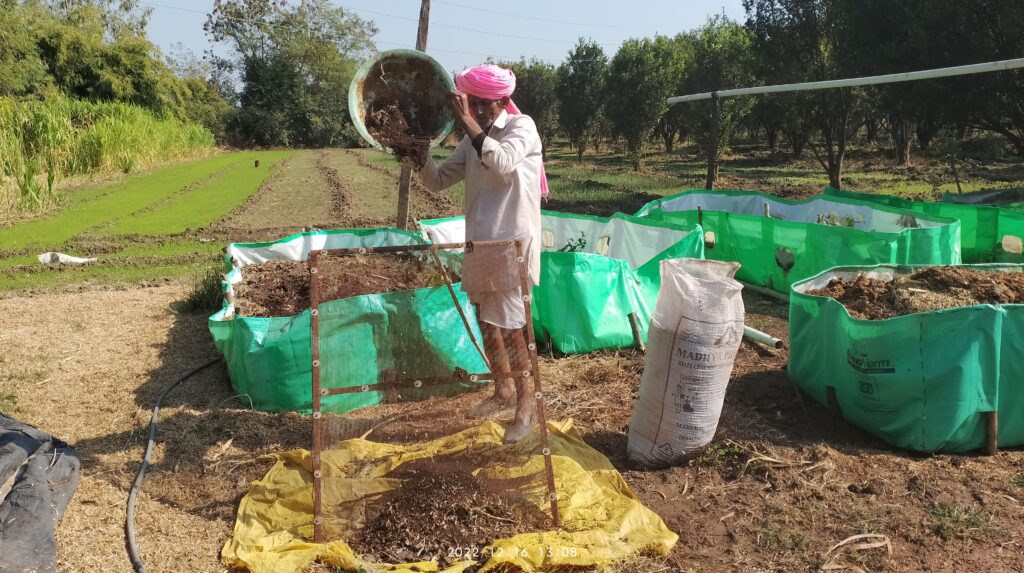
A deep dive
Results across four areas
Solidaridad implements programmes in four integrally interconnected result areas: at the farm or producer level, at the business level, at the policy level, and at the market level. All with the overall goal of building resilient communities through sustainable supply chains.
In line with the multi-dimensional scope of good practices encompassing social, environmental and economic performance, Solidaridad in Asia continued to strive beyond good agricultural practices and income increase to build climate-resilient and sustainable farming ecosystems in 2022. We made considerable progress in supporting farmers to produce in balance with nature, optimizing farm management for better yield and income, promoting decent working conditions with fair payments and reducing pollution and waste in industry and mining. It was witnessed that by 2022, over 1 million farmers, with more than 100,000 women, have been trained on good agricultural practices across different projects in Asia and covering almost 900,000 hectares of land under sustainable management.
Regenerative agriculture has proven to be a holistic approach to building the resilience of the agricultural ecosystem with a positive ripple effect on soil health, food quality, biodiversity improvement, water and air quality. In 2022, we worked towards creating a mindset shift among farmers towards making regenerative farming the new norm across various commodities including cotton, soy and sugarcane. Over 17,000 cotton farmers in India covering 25,000 hectares and 1,000 sugarcane farmers covering 1,497 acres have been certified for regenerative practices in India.
Adoption of regenerative and organic farming practices like cover cropping, organic manure, intercropping and integrated livestock grazing are creating climate-resilient and viable farming ecosystems. In cotton, sustainable production and adoption of organic practices have led to reduction of about 7.7 million kgs of chemical pesticides and fertilizers from the system. Various commodities like cotton, soy and palm oil promoted the preparation of bio-fertilizers and bio-pesticides using locally available material and farm waste. In sugarcane, more than 2500 vermi-composting demonstrations were set up across various project locations in Madhya Pradesh and Rajasthan. This shift towards optimum or no use of fertilizers has also been strategic to reduce input costs, especially in cases like Indonesia where the prices of synthetic fertilizers increased by almost 100 percent in 2022.
We saw encouraging trends on the potential of regenerative farming practices to contribute to reduction of carbon emissions. In sugarcane, Solidaridad worked with farmers to tackle the widespread practice of stubble burning which releases N2O and is one of the major contributors of greenhouse gas emissions in India. Use of bio-digesters and practices like mulching have resulted in carbon sequestration of at least 1.61 tco2eq/hectare/year. The carbon credit payments as returns for lowering carbon emissions is expected to push the adoption of regenerative farming in Asia over the coming years.
In addition to improved soil health and greenhouse gas reduction, optimum use of water as part of good agricultural practices saved more than 500 billion litres of water in 2022. Commodities like castor, reduced water consumption by almost 30 percent in their demo plots. Additionally, practices like intercropping are also playing an important role in water conservation. Overdependence and monocropping of cereal crops (rice and wheat) on tube well irrigation has resulted in groundwater depletion in many parts of India. This is being addressed by intercropping with crops like mustard and vegetables, which also boosts income due to an increase in productivity. Commodities are also attempting climate adaptation to respond to extreme weather conditions. In Bangladesh, suitable soybean varieties were developed with resilience to saline, waterlogging and water shortage conditions.
The year 2022 also saw wider adoption of internet-of-things based solutions like sensors, automatic weather stations to optimize farm management. These tools have been very effective in preparing farmers for expected losses due to changing weather conditions, irrigation scheduling, pest and diseases control etc. The timely and precise advisories have contributed towards the reduced use of chemical pesticides for the control of pests and diseases.
Solidaridad in Asia is also making strides in promoting decent working conditions and reducing pollution in industries through our expanding textile and leather commodity interventions. More than 15,000 workers in Industrial minerals and over 2,900 workers in leather industries from three major leather clusters in India have improved working conditions. We are set to replicate the success of our leather projects in one of the biggest textile clusters in India in partnership with the Government of India.
In order to create a level playing field for the farmers, Solidaridad Asia has been facilitating effective market linkages while also improving access to financial services. Creation and strengthening of farmer-producer organizations has improved the ownership of farmers in the value chain. In 2022, more than 50,000 farmers were organised in farmer groups and close to 4,000 service providers and processors were trained/supported. The farmer-producer organizations and rural entrepreneurs played various roles across commodity value chains including facilitation of advisory services, information dissemination, availability of quality seed and other agricultural inputs, farm machinery. Farmer producer organizations are also setting up post-harvest processing infrastructure which lead to better prices for the yield. The supporting business ecosystem like better connectivity to markets and direct procurement from farmer producer organizations has resulted in income increase for more than 800,000 farmers in Asia.
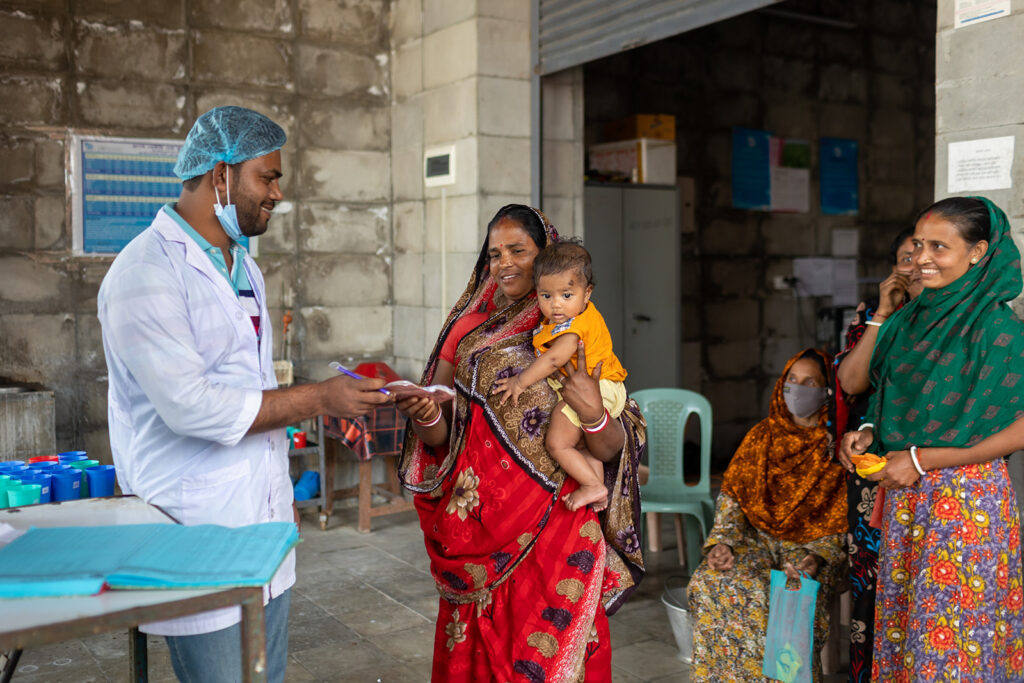
Farmer producer organizations have also been a critical space to promote gender representation. Engagement of women in farmer producer organizations and its governance has increased their representation in decision-making on sustainable produce. As a result of our capacity building, women farmers across commodities are exploring income diversification activities for instance, in India and Bangladesh where soy women farmers are processing and preparing value-added products like soy milk and tofu.
Under Reclaim Sustainability, regional and national sustainability frameworks and multi-stakeholder platforms have been driving fair value distribution in the chain and sustainable trade and consumption across the Asian countries. The regional sustainability initiatives by Solidaridad Asia in tea, palm oil and cotton are paving the way for national and regional sector transformation. In 2022, there was a major focus on convening and strengthening Regional Sustainability Initiatives to collaborate on sustainability solutions and promote regenerative agriculture especially in the context of smallholder farmers.
- The Asian Palm Oil Alliance, launched in September 2022, is spearheading the sustainability agenda in Palm Oil by reducing the gap between producing and consuming countries and addressing the geo-political interests in the region.
- The second Asian Tea Alliance summit also committed to promote national sustainability standards while addressing the structural issues in the tea supply chain like market demand, price discovery, climate change adaptation and mitigation, access to technology among others.
- In an effort to make India the largest producer of certified regenerative cotton, Solidaridad Asia, Centre for Responsible Business and regenagri came together to build the Alliance of Cotton and Textile Stakeholders on Regenerative Agriculture. The alliance will collaborate with partners to develop standards and guidelines for sustainable cotton production which can address the structural challenges posed by fragmented supply chains and climate change.
- The Sustainable Castor Association has created the Sustainable Castor Caring Environment and Social Standards code in accordance with globally accepted principles and local stakeholder involvement with clear social, economic and environmental objectives. Over 6,200 castor farmers covering 6,000 hectares have been certified under the code. These farms have shown 22 percent higher yield and the profits have motivated farmers to increase their land under castor farming.
Apart from the regional sustainability initiatives, Solidaridad in Asia continues to engage with various public and private stakeholders like government ministries and departments, industry associations, agribusiness consortiums, premier research institutes among others to promote sustainability across various commodities. In Sri Lanka, Solidaridad was endorsed by the Government as their technical partner in the leather portfolio. Similarly, in India we are partnering with the Government of India to kickstart the textile project on pollution abatement and water conservation. Various commodity programs are building such strategic collaborations with the public sector to develop sustainability solutions and address issues in the value chains.
Solidaridad’s approach to market uptake in Asia has been driven by the goal of democratizing nutrition and creating an empowered and aware customer base for smallholder produce. In 2022, we focused on connecting brands and retailers to sustainable supply chains, promoting sustainable sourcing and consequently creating a demand for sustainable products in the market.
There is a wider adoption of digital tools like Soli-Trace which promote traceability in the supply chain. Following India’s success story, Bangladesh adopted the TRINITEA framework in 2022 to develop cluster-based service mechanisms for quality improvement and sourcing of green leaf for developing traceable sustainable tea value chain. Traceability feature has also been adopted in the dairy sector under the Trust Dairy initiative to build transparency and assurance on quality among consumers. Apart from tea, other commodities like soy and palm oil are also developing digital traceability solutions for a transparent and sustainable supply chain.
Engagement with businesses and private sector stakeholders is key to mainstream sustainability principles and therefore Solidaridad Asia is committed to partner with brands/buyers for responsible and ethical sourcing and developing market linkages and sustainable solutions in alignment with emergent demand. Campaigns and events like Smallholders Tea Week in Indonesia, where smallholder tea products were promoted to hotels, restaurants and cafes, are interesting cases for market uptake campaigns.
With the growing demand from brands for compliance with sustainability standards, Solidaridad Asia is also supporting smallholder farmers to get certified against relevant sustainability frameworks to easily access domestic and international markets like in the case of RSPO certification for palm oil farmers in Indonesia or regenerative certification in cotton or sugarcane in India.
Change that Matters Stories
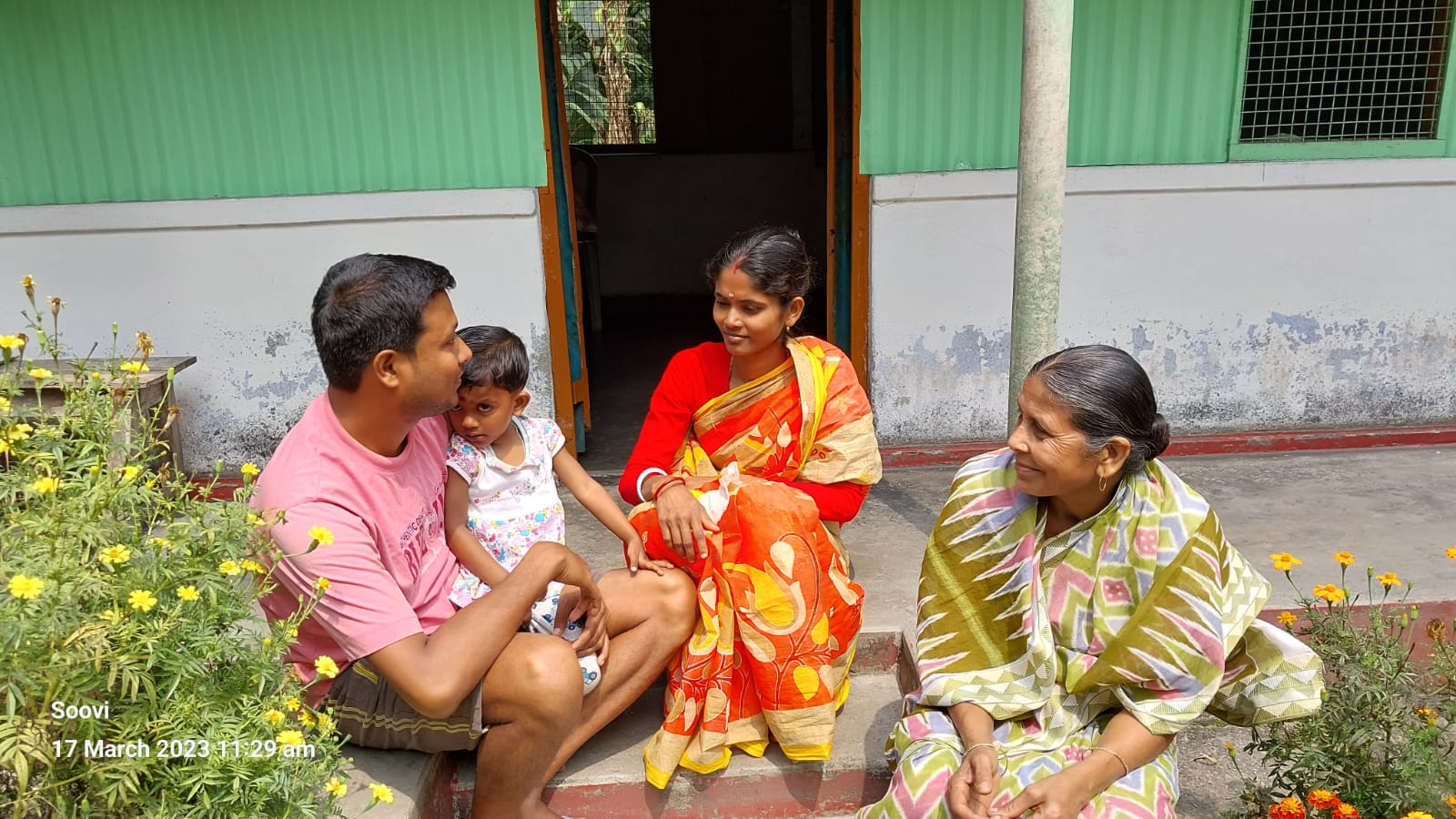
Farming for a better livelihood
Bibek Sen is a small-scale farmer with a 1.6 acre tea garden he inherited from his father in Maynaguri taluka of Jalpaiguri district, North Bengal, India. He’s committed to improving his tea from the ground up and focused on soil health to boost quality and attract a higher price.
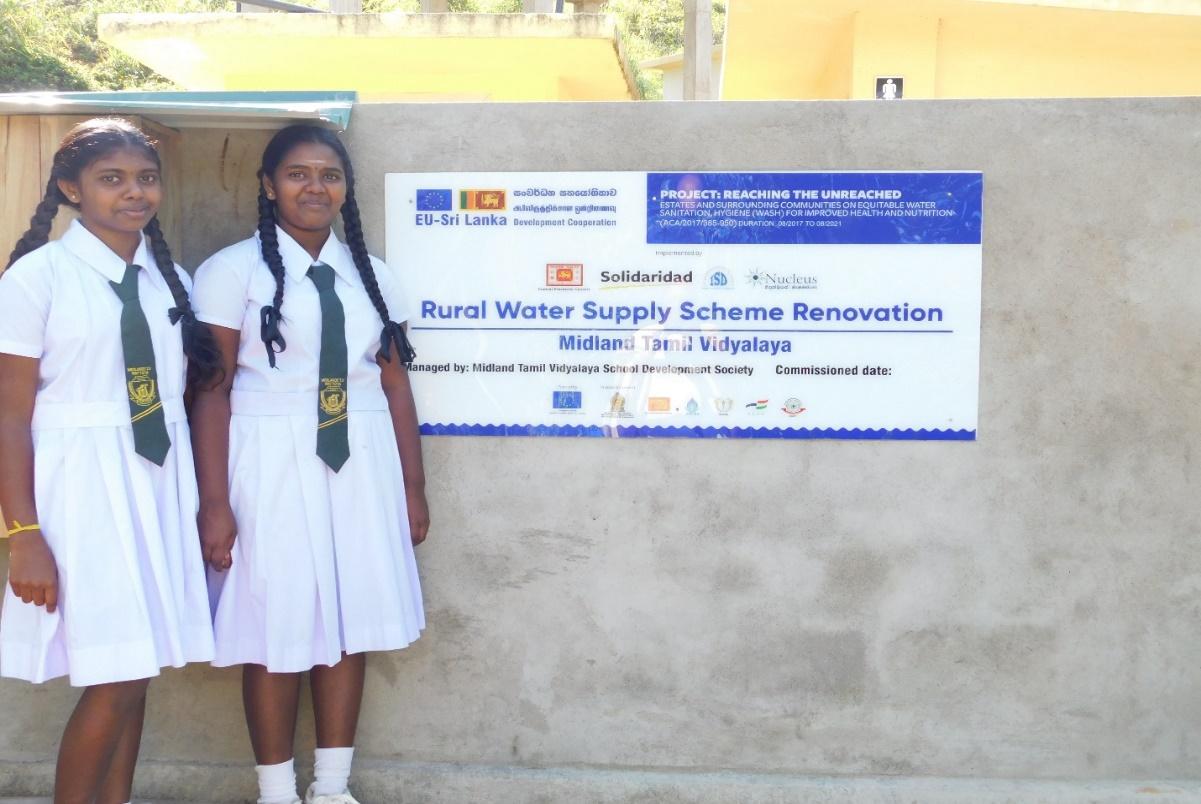
BEATING THE WATER & SANITATION CRISIS IN SRI LANKA
For communities in and around the tea planation areas in Sri Lanka, water and sanitation remain significant challenges. Solidaridad stepped up to the challenge with the Reaching the Unreached programme designed to rehabilitate and improve water and sanitation conditions in 50 estates and 100 villages.
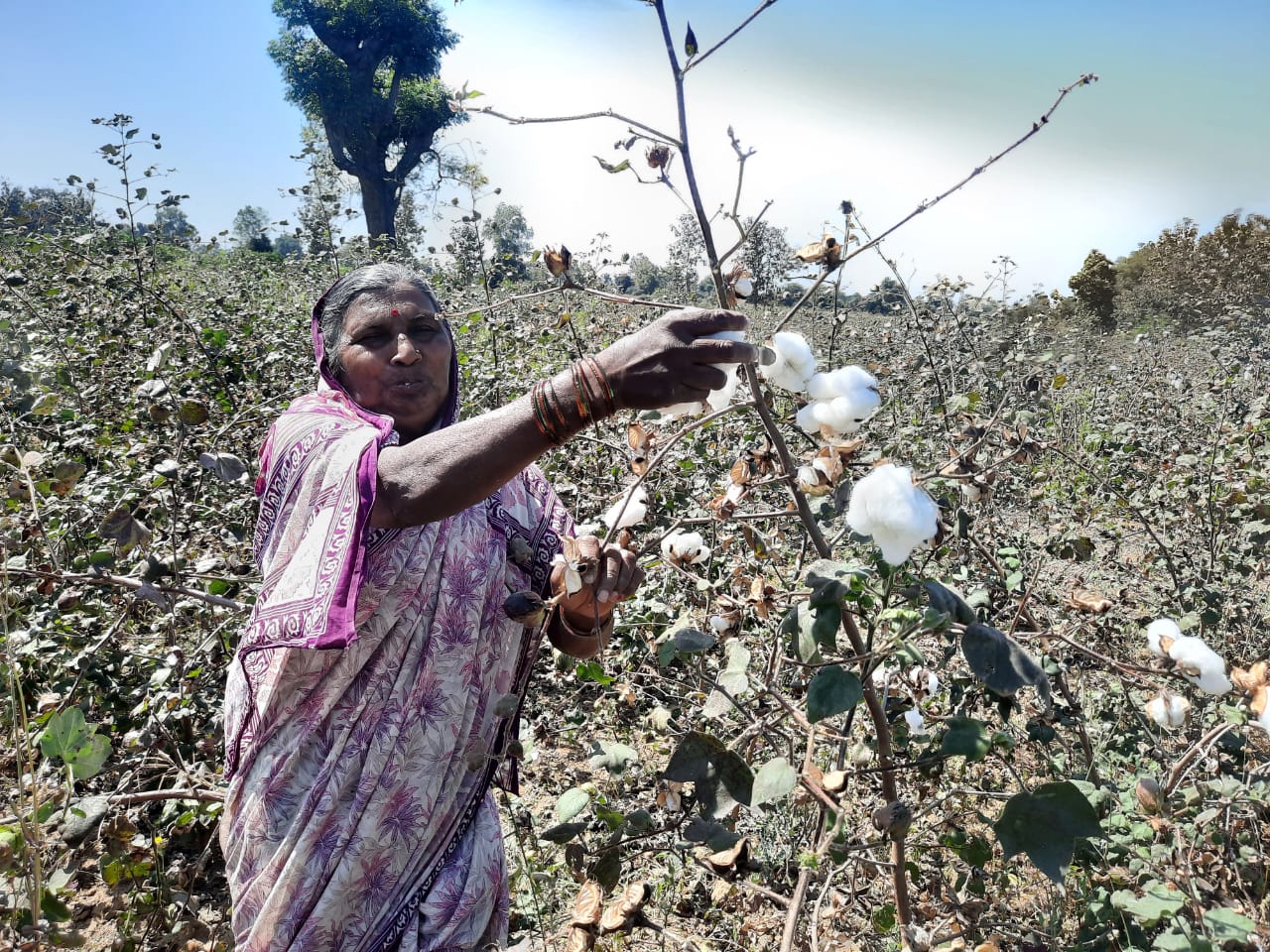
Starting anew with regenerative agriculture
Agriculture is at the centre of a number of global challenges today. Climate change, depleting water tables, degraded soils, loss of biodiversity along with a staggered social and economic development—to name a few. For cotton farmers in India, regenerative agriculture spells a new beginning.
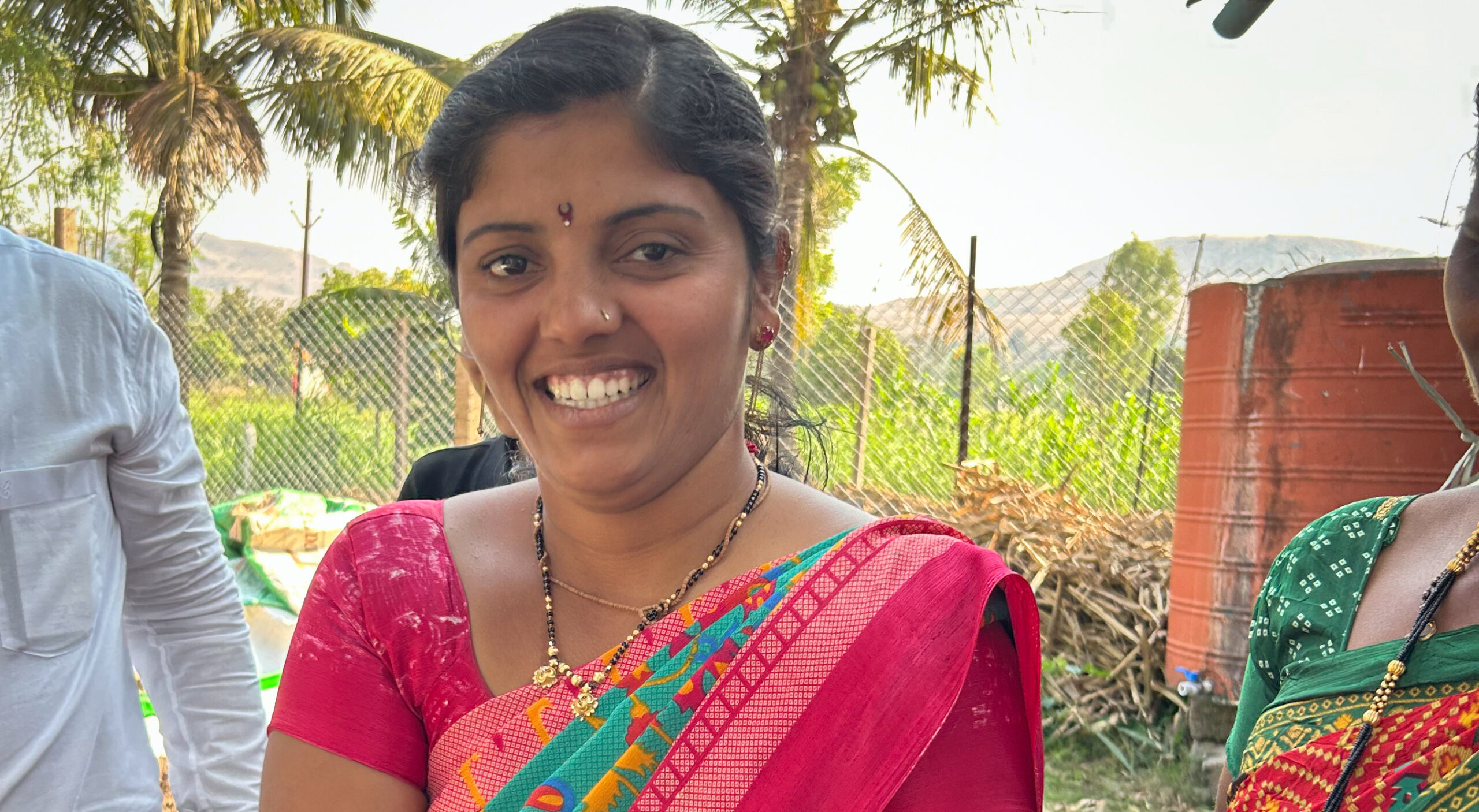
A SUGARCANE FARMER FINDING NEW AVENUES FOR INCOME IN INDIA
Swati Sanjay Pavale is a small-scale sugarcane farmer in the Maharashtra region of India. Recently, she has found new ways to produce more sugarcane in an environmentally-friendly way, while also boosting her income.
Innovative Sustainability Solutions
Insights
Pushing the envelope
We doubled down on our commitments to integrate gender inclusivity, and balance economic development with environmental preservation. Digital innovations were leveraged to engage and connect smallholders, while also bridging gaps created by Covid-19 restrictions.
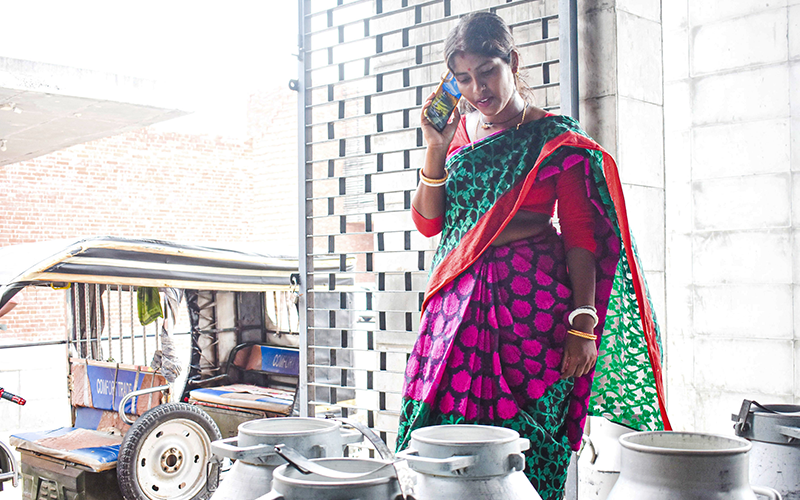
The global population is estimated to reach 9.7 billion by 2050; to feed them, a farmer must overcome several challenges. Technology can be an enabler for farmers, smallholders in particular, to meet the challenges of climate change as well as pressure on land and water resources – to grow sustainably.
Solidaridad introduced several technological solutions for farmers in the field, which can help them farm efficiently, check wastage and reduce their input costs, thereby improving their income. These innovations include SoliMet, a hyper-local weather station, SoliProbe, an instant soil analyzer and Ballotronix®, an instant tea leaf reader, among other solutions.
For a farmer struggling with what kind of nutrient their soil needs and if it needs water, SoliProbe removes the guesswork and helps them get the right information – and almost immediately. Weather is the most important element that affects farm production, plant growth, disease pressure, insect development, crop yield, water and fertilizer needs, and all the farm workflow processes. SoliMet will help farmers to make the right decision at the right time by monitoring accurate site-specific meteorological parameters. It also provides timely information about pests. Ballotronix® automates the process of assessing the quality of tea leaves, providing a faster and near error-proof grading that can ensure a better and fair price for the farmer. It also identifies diseases, if any, present on the tea leaves.
Women in Formal Supply Chains
Digital divide is a major contributor to further widening the gender gap in agriculture. Through our digital interventions, we have brought nearly 12,000 women farmers in Bangladesh and 5,000 in India into the formal supply chain. Additionally, financial inclusion has strengthened their position in the formal market system.
Carbon is the word on everyone’s lips nowadays due to the pressing challenges of climate change, which is affecting everyone. And the subject is a hot one in agriculture because of the potential to sequester more than 37.5 Giga tons of carbon per annum, which is more than the current level of global emissions. In India, the agriculture sector contributes around 20% of all the greenhouse gases emitted in the country. The main emissions are due to livestock, the manufacture and use of nitrogenous mineral fertilizers, the use of diesel to power agricultural machinery and changes in land use. Yet, Indian farmers hold the rare potential not just drastically to reduce emissions, but to sequester atmospheric carbon back into the soil, providing a natural way to limit global warming whilst producing nutritious food.
During 2022, Solidaridad promoted regenerative practices in Asia such as crop diversification, tree planting, reduced tillage, mulching, and water conservation techniques that would lead to better soil organic content capturing and storage along with reduced emissions. These practices remove carbon present in the atmosphere and return it to the ground, thus converting the croplands into a ‘carbon sink.’
The initial pilots in multiple commodities show four fundamental benefits for farmers opting for carbon sequestration using regenerative agricultural practices. Firstly, soil organic carbon helps restore degraded soils, which can improve the agricultural productivity of the farmers while reducing costs due to the reduced use of fertilisers and chemicals. Secondly, it increases the climate resilience of the farm as healthier soils make farms more resilient against both droughts and heavy rainfall. Thirdly, and most importantly, the process can generate additional income from the rapidly expanding voluntary carbon credit markets. The potential for a farmer in India is to sequester between 1 tCO2 (1 ton of carbon) to 4 tCo2 by adopting regenerative practices. Per ton of carbon, today is priced between Rs. 1500 to Rs. 2500, which could be a significant revenue source for the farmers. Fourthly, the regenerative certification has also started to fetch price premiums in the market between 3 to 10 per cent.
Soli-Trace is a Solidaridad-developed traceability solution that digitally transforms agri-businesses into purpose-driven brands, delivers better value for farmers and empowers consumers with supply chain transparency. Soli-Trace captures the sustainability footprints at every touch point of the commodity’s journey from farm to consumer. It creates timestamps across all stages of the supply chain, recording the sustainability practices of the farmers, the date and volume of the commodity procured, information about collection centres, transportation to the factories, processing and packaging. Consumers can access the story of the product with vivid details by scanning the QR code printed on product packages.
The transparent mechanism to trace the sustainability adherence of the product all through its value chain increases customer trust and goodwill for the brand. Soli-Trace provides a technological means to stay relevant with the changing times and thrive in a community of consumers who are growing increasingly conscious of the health, environmental, social and ethical implications of every choice they make, be it a product or lifestyle.
Soli-Trace is presently implemented in the tea sector of India and in the process of being launched in the palm oil and cotton sectors of Malaysia and India, respectively. The tea farmers supported by Darmona tea company are getting 50% more prices than the market using the Soli-Trace traceability solutions.
Organization & governance
Developments
During 2022, the Thailand country operation started with a dedicated country manager and the position of country manager for Indonesia was filled. We have been working to start operations in the Philippines and Nepal.

Solidaridad Asia has taken major steps to ensure gender balance at the leadership level. By the end of 2022, of the 8 countries where we have project offices, three offices are run by women country managers, in India, Indonesia and Sri Lanka.
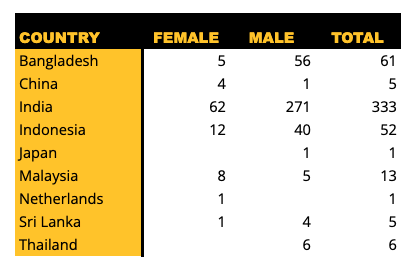
The actual record count of number of staff in 2022 in Asia was 561, based on the ongoing and new projects approved in 2022. At the end of 2022, we counted 477 people working for Solidaridad Asia – the vast majority based in India.
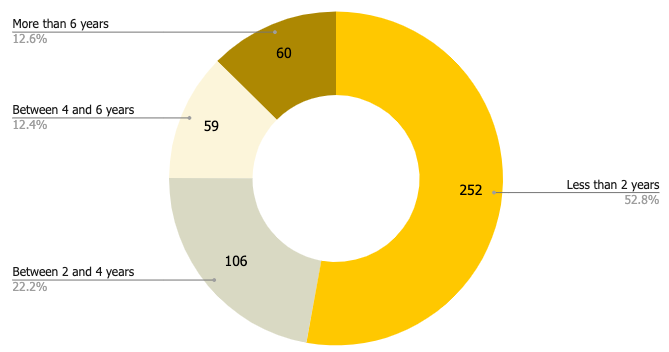
Solidaridad Asia has a lot of young staff that recently joined. Over 50% of the staff is less than 2 years with the organization.
During 2022, the Thailand country operation started with a dedicated country manager and the position of country manager for Indonesia was selected from an internal recruitment process, looking at the gender diversity in the management team and providing career growth for an existing senior colleague to spearhead the country’s operation. The regional team in Asia had planned to move to a separate office after organisational restructuring, and the process was initiated accordingly. At the same time the regional office decided to start looking for other country operation opportunities and have been working to start operations in the Philippines and Nepal.
Around 13.15 million euros worth of projects were secured out of the total applications in the pipeline. Additionally, the project’s value of 5.20 million Euro are still in the discussion stage with probability of starting in 2023. The regional office was able to diversify the funding source to include local donor organizations. The major donors are the Embassy of the Kingdom of the Netherlands in Bangladesh, the Government of India, Vodafone Foundation, Coca Cola, Apical, Nayara, Bridgestone.
One case was registered in 2022. The case was registered by a colleague for a conflict between a regular staff member and an associate working as support staff. The Integrity team did an investigation to arrive at a conclusion and take appropriate action. The case has been settled in agreement with the plaintiff.
The platform for staff orientation during onboarding and the global onboarding programme have been very useful for the effective implementation of integrity policies across all the countries in Asia operations. The regional office has plans to develop a monthly orientation of colleagues from different countries in Asia for continuous orientation of colleagues to keep a high standard of staff understanding the importance of integrity policies for the organization and to encourage to reach concerned persons as and when required.
In 2022, Solidaridad in Asia took the lead in undertaking a global research study to explore the relationship between commonly held expectations of sustainability against farmers’ perception of fairness and satisfaction. The objective of this small farmer survey is to bring smallholder farmer’s voice and perspectives forward. The expectations were divided into three areas: Prosperity, Inclusivity and balance with nature. The perceptions of the farmers were collected directly from the field and are checked against the secondary research conducted at the macro and meso levels. The study was conducted by collecting primary data of smallholder farmers across 18 countries in 8 commodities, covering nearly 10,000 farmers.
With continuous focus on capturing greater insights and learning from it, the teams in Solidaridad Asia continued using several digital tools like TRINITEA, i2i, Sourcetrace, etc. to capture granular data in our programs.
To strengthen the learning component, a 3-day workshop in Kolkata (India) was organized for the internal team to introduce concepts of results-based management and problem analysis with our programme team.
In 2022, the communications team in Asia engaged in a variety of activities to ensure visibility and outreach of programmes across the region. The team initiated online seminars or webinars across Asia and covered multiple themes. Throughout the year, the communication team was actively involved in designing branding collaterals such as brochures, videos, flyers, social cards, and other communication material. The team ensured regular updates on events and developments on the social media pages and the website of Solidaridad Network.
Awards
Solidaridad in Asia managed to get two awards in 2022. First was the Water Sustainability Award 2021-22 for our innovation in water technology through retrofitting of the fleshing process that helps reduce water consumption in leather manufacturing. The TERI-IWA-UNDP award was conferred on World Water Day 2022.
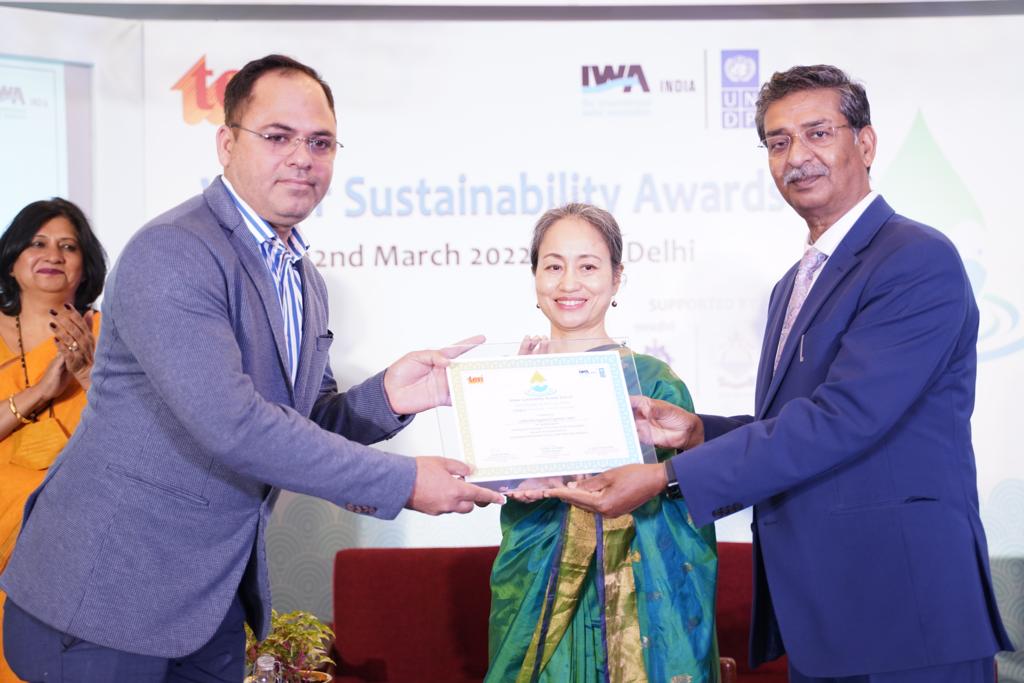
Second was the Global Good Award 2022 for our project Pollution Prevention and Efficient Water Use in the Unnao-Kanpur Cluster in the category of Community Initiatives. Of the seven strong contenders, we clinched the gold!
Communication initiatives
We organized a three-month-long targeted awareness campaign on sustainability in tea from farm to cup, across print, online and social media, which reached more than 20 million consumers
We also organized a mega tea convention, and supported the big-ticket launch of Asia Palm Oil Alliance, Alliance of Cotton and Textile Stakeholders on Regenerative Agriculture, SAFAL for Integrated Water Resource Management in Bangladesh, and Smart Agri project in Odisha
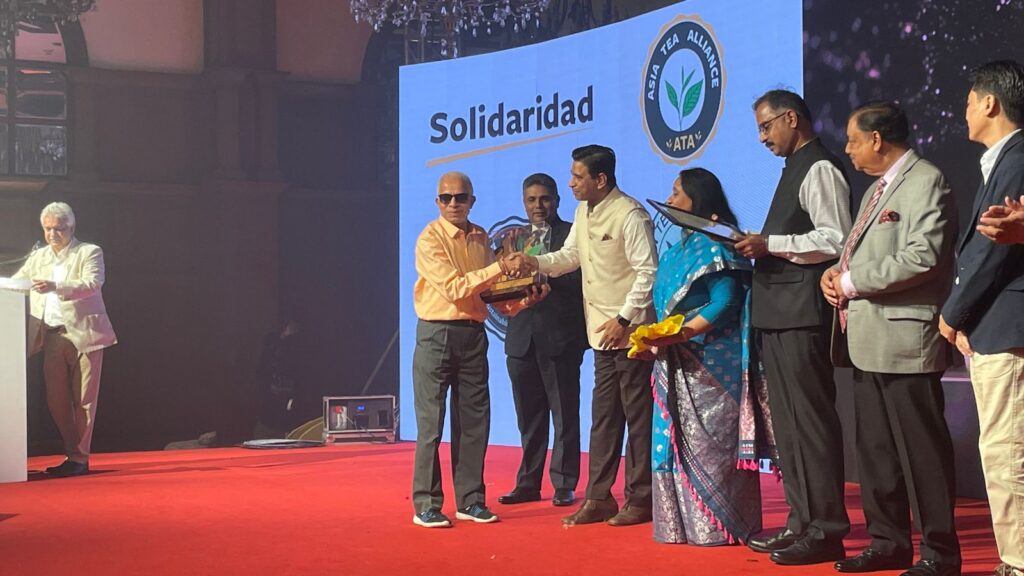
For Smart Agri, regenerative agriculture, Tea, Sugarcane, Leather, Castor and other programmes, the communication team developed designed and disseminated various information and education materials. In addition, they designed and produced of more than 50 reports, brochures, flyers, and banners.
We managed to get nine articles published in The Good Sight magazine (which targets development sector audience), covering various commodities and key programmatic themes and a well-read article in Industry Outlook.
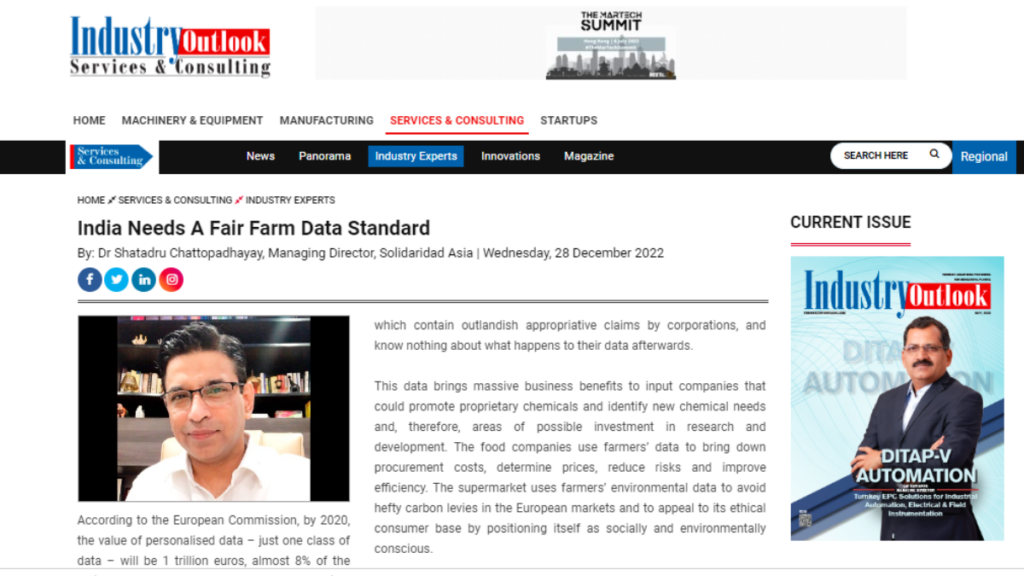
Finance
In Asia, both income generation and expenditure on projects showed significant improvement from 2021, reflecting a recovery from pandemic levels. Beyond the approved budget, Asia was able to secure additional funding through government and CSR grants.
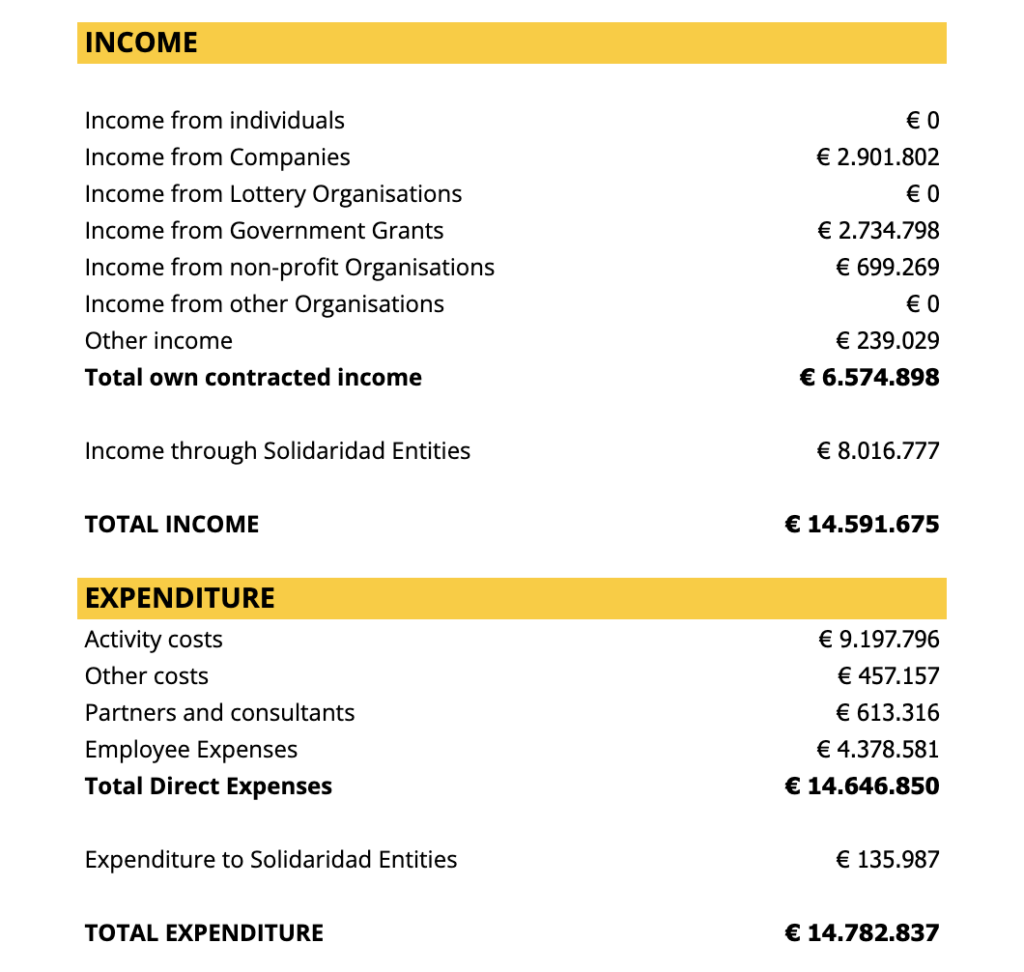
The full audited annual statements will be added below as soon as they are available:

